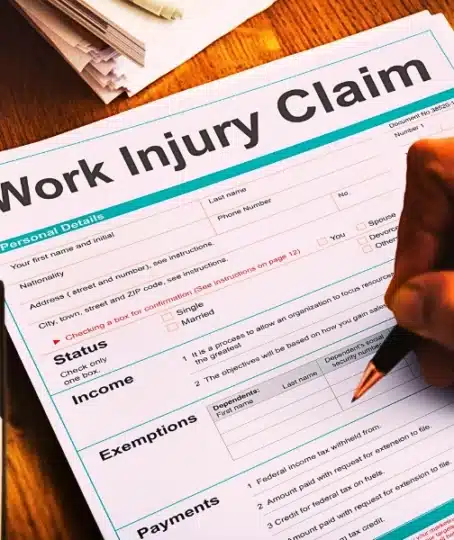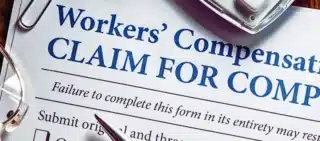
Common Reasons an Employer Won't Report Your Work Injury A total of 101,400 non-fatal work-related injuries and illnesses occurred in...


How do I report a workplace injury to my employer? In Illinois, you are required to inform your employer about your injury within 45 days of the incident or upon realizing a work-related illness or injury. This can be done either verbally or in writing. Knowing the steps to take following an accident is crucial, including how to report your workplace injury.
Our workers’ compensation attorneys know what it takes to get the benefits you need. Contact Strong Law Offices at (309) 393-2928 to assist you through the claims process after your workplace injury.

In Illinois, workers are required to report a workplace injury within 45 days of the incident occurring. For injuries or illnesses that take time to manifest, such as those related to toxic exposure or repetitive stress, the notification must be made within 45 days of becoming aware of the injury's connection to your work.
While some companies have policies stating that an injury must be reported before the 45-day limit to qualify for compensation, this is not a legal requirement. Nevertheless, it’s advisable to report a work-related injury as soon as possible, even if it doesn't seem severe. Soft tissue injuries can develop or become apparent days or weeks after the event, so early documentation is crucial in safeguarding your rights.
It's best to report your injury promptly. Just because you have a 45-day window doesn't mean you should wait that long. Reporting your injury sooner will make it more difficult for your employer to contest the claim later on.
In 2022, Illinois private industry employers reported 112,500 injuries and illnesses in the workplace that were nonfatal. Of these, 73,500 were serious (DART cases) that required time off, job transfers, or restrictions, translating to a rate of 1.8 cases per 100 full-time workers. Notably, 70% of these DART cases resulted in at least one day off, exceeding the national average of 67%. The remaining 39,000 cases were recordable but did not involve time off, occurring at a rate of 0.9, lower than the national rate of 1.0. With these numbers, there is a chance that you may find yourself the victim of a workplace injury at some stage. Therefore, knowing what to do after a workplace injury may be invaluable to ensure the success of your claim.
The Illinois Workers’ Compensation Act provides a time limit for reporting a workplace injury of 45 days after the incident. However, it’s advisable to inform your employer as soon as possible after the injury to expedite the claims process and avoid missing the deadline.
Report your injury to your supervisor or HR, not just a coworker. While you may inform a colleague for assistance or as a witness, this does not fulfill the requirement for workers' compensation. Ensure you follow your employer's injury reporting protocol and keep a copy of any reports for your records.
You can notify your employer about the injury either verbally or in writing. Having a copy of the report serves as proof that you informed your employer about the incident.
If you only provide a verbal report, your employer can easily challenge your statements or the timing of them. It becomes your word against theirs. Submitting a written report establishes a documented record that can help clarify any disputes later on.
Unfortunately, employers often do not prioritize your best interests. If time has passed since you informed your supervisor about your injury, there’s a good chance they may have forgotten your discussion. Additionally, they might be facing pressure from their employer to overlook your report or even misrepresent the situation. Completing a written accident report can help eliminate this risk.
Employers may hold a negative attitude towards workers’ compensation claims and may take steps to prevent employees from filing them. To safeguard yourself, it is advisable to fill out a written accident report for any injury, no matter how minor it may seem at the time. Submitting an accident report doesn’t involve any cost to you, but it could be invaluable down the road.
If you must report verbally, be sure to write down the details immediately afterward or email your supervisor a summary of what was discussed, which will create a timestamped written account of your report. If you use your work email for this, make sure to BCC your email or forward the message to yourself to keep a copy.
When preparing an accident report, include the following information:
It's important to document the incident right after it occurs to gather sufficient evidence for your claim. Start by recording the date, time, and location of the incident. Provide a brief description of what happened, the nature of injuries suffered, and the details of witnesses present.
Take photographs of the accident scene and your injuries. Make sure the images capture contributing factors to the accident, such as trip hazards, defective equipment, or areas with inadequate lighting.
The quality and relevance of the evidence you collect are vital for the strength of your workers’ compensation claim. A workers’ compensation attorney can help you compile the relevant evidence, including:
Thorough medical documentation is essential for a workers' compensation claim. This should encompass detailed descriptions of the injury, diagnosis, and the recommended treatment plan from your physician. These records form the basis of your medical evidence. Additionally, your hospital records should provide an overview of the treatments you have undergone, including surgeries, medications, and complications. If you have seen specialists such as orthopedists or neurologists, their reports can enhance the depth of your medical evidence.
Eyewitnesses, including coworkers and supervisors, offer essential insights during incident investigations. Their accounts can reveal how the accident occurred and highlight any safety lapses or protocol violations. Neutral observers can also provide valuable, unbiased perspectives.
Work-related documents are essential for providing context around an incident. This includes the work injury report form, incident records like photos or videos, and evidence of safety protocol violations. Filing an accident report promptly can capture the sequence of events and actions taken, while records can offer additional details. Evidence of safety breaches is vital for establishing liability.
To seek reimbursement for medical costs and lost income, it’s essential to have accurate financial records. This should involve pay stubs to determine lost wages, receipts for any expenses you’ve paid out of pocket, and detailed medical bills to support your claim for compensation.
If you have sustained severe injuries, it’s crucial to get emergency medical help. For less serious injuries, consider scheduling an appointment with a doctor soon after the workplace incident.
You may wonder, can I go to my own doctor for workers' comp? In Illinois, you can select up to two physicians of your choice, as long as they are part of your employer’s Preferred Provider Program (PPP). If your employer does not have an established PPP, you may still choose up to two doctors.
A physician can assess your injuries, advise you on when you can safely return to work, and determine when you’ve reached maximum medical improvement. Obtaining medical treatment will establish a connection between your injuries and the workplace accident. Be sure to gather evidence by keeping records of your treatment, medical costs, and how the injury has impacted your daily activities. This documentation will be helpful in evaluating the worth of your workers' compensation claim. Without documented medical expenses, you can’t calculate your workers’ compensation benefits.
In Illinois, employers are required to have workers' compensation insurance for employees injured on the job. They must post a notice about workers' comp rights, have workplace health and safety guidelines, and report injuries to the Illinois Worker’s Compensation Commission if there are more than three lost workdays. Discrimination or harassment against employees exercising their rights is prohibited, and employers cannot charge employees for the insurance.
In most states, including Illinois, employers are mandated to offer workers’ compensation insurance for their employees. This insurance is designed to cover medical expenses and lost income for employees who suffer injuries or illnesses linked to their work. Employers can acquire this insurance from a licensed insurance company or, if permitted by state regulations, through self-insurance.
Employers must report workplace injuries or illnesses to their workers’ compensation insurance provider and the state workers’ compensation board, as mandated by law. This includes offering information about the circumstances of the injury, the type and severity of the injury, and medical care the injured employee has received. Timely reporting is crucial for ensuring that injured employees obtain the necessary benefits, and that the workers’ compensation process runs efficiently.
Employers are legally prohibited from retaliating against employees who assert their rights under workers' compensation laws. This applies to actions such as termination, demotion, harassment, or any form of discrimination against employees for submitting a workers' compensation claim or reporting a workplace injury. Policies against retaliation are essential to ensure that employees can report injuries and pursue necessary medical care without the fear of negative consequences from their employer.
Consulting a workers' compensation lawyer is wise if you're considering filing a claim. He or she can advise you on various aspects of your case or questions you may have, such as how long workers’ comp benefits last. Your lawyer may also assist with the filing process, negotiate settlements, gather evidence, and advocate for your interests, enhancing your chances of securing maximum compensation. For help with reporting a workplace injury and understanding your benefits in Bloomington, Illinois, contact us at Strong Law Offices to schedule a free consultation. Our workers’ comp attorneys are ready to assist you.

Common Reasons an Employer Won't Report Your Work Injury A total of 101,400 non-fatal work-related injuries and illnesses occurred in...

At Strong Law Offices, we have a team of workers' compensation lawyers who understand the financial setbacks and physical limitations...

Common Equipment Involved in Run-Over Accidents Illinois job sites, from construction zones to industrial plants, depend on machinery to stay...